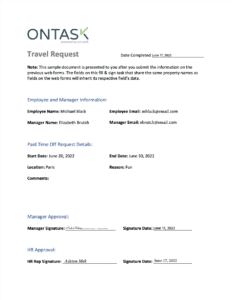As law firms attempt to remain competitive in a rapidly changing market, they must find new ways to streamline their operations. Legal workflow automation software provides law firms with the tools they need to streamline and automate every aspect of their business.
This can include automating tasks such as document management, email correspondence, billing, invoicing, or even entire processes such as discovery or litigation support.
Legal workflows are a critical element of the modern law firm. To combat against time wasted on admin tasks, they must automate as much as possible as they grow in complexity and volume. Automation enables staff to focus on providing value-added services to clients instead of spending time on administrative tasks.
What is Legal Workflow Automation?
Legal workflow automation is applying technology to handle legal workloads and minimize, if not eliminate, human input.
Law firms can no longer depend on traditional task and case management methods. Thanks to advances in artificial intelligence and machine learning, it’s possible to automate a wide range of legal tasks with high accuracy. Studies show that large law firms have started using legal workflow solutions to automate several routine tasks, such as contract creation, due diligence reviews, and legal research. On the other hand, smaller firms are still in the early automation stages.
Legal workflow automation allows you to process most of the mundane tasks in the background, so you have more free time to focus on more complex and profitable legal issues.
Legal Workflow: Automation vs. Manual
Legal processes can get swamped, especially when manual administrative tasks are involved. Between client onboarding, document management, handling case files, and other administrative work, it can be a lot to handle. Manual workflows are arduous, time-consuming, and prone to human error.
When the mountain of admin paperwork gets too large, legal professionals aren’t able to meet their clients’ needs. So, how can legal professionals be expected to get it all done while creating the best client experience possible?
The answer is automation. Typically, lawyers can automate 23% of their daily work, while paralegal’s can automate about69% of their paralegals’ tasks. This means in a world where tech is constantly changing; your law firm no longer needs to struggle to keep up. To gain a better perspective, read more on the benefits of legal workflow automation.
Automation Is The Future of Law Firms
Legal workflow management is increasingly becoming a vital part of the legal industry. In fact, Deloitte reports that over 110,000 legal roles will be automated in the coming decade, and this is why:
Increased Workflow Efficiency
Workflow automation software will help you improve your law firm’s efficiency and productivity in several ways. It’ll be easier for you and fellow attorneys to manage yours schedules and workload, creating more time to spend doing high-level work that requires legal expertise, for improved service delivery and satisfied clients.
An effective, reliable, and responsive legal workflow automation software has features that facilitate the following:
- Case management to track cases by automating the filing process in tandem with existing collaboration tools.
- Project management systems allow legal teams within an organization — from paralegals and associates all the way up to senior partners — to collaborate effectively.
- Streamlined completion of critical and time-intensive processes
A law firm is usually a hub of activities. Among the most critical and time-sensitive processes include:
- Client data collection, entry, and validation
- Legal document preparation, processing, and management
- Handling care-related tasks efficiently and promptly
- Collaboration between legal professionals within the firm and their clients
- Ensuring data and systems security
- Tracking billable hours
- Collecting digital signatures
Legal workflow solutions eliminate any bottlenecks in handling and completing these tasks. Automation also reduces the time, effort, and energy spent on each task creating more time to focus on more strategic aspects of your firm.
Ensure Document Accuracy and Compliance
Document accuracy is critical to ensure a law firm runs smoothly. This involves making sure every document contains all relevant information and having a good record-keeping system in place. Information recorded on documents by humans is often prone to error. Automation vastly reduces these input errors to ensure documents are correct before being sent and used in a court of law.
To stay compliant, your documents must meet industry standards and comply with regulations. For example, if you’re working with legal documents such as contracts or wills, they must be approved by an attorney before you can use them in court proceedings.
Support Business Scale and Growth
Legal workflow automation can help your firm scale up and meet client demand, and grow to meet their ever-increasing expectations. An automated system can adapt to any changes in the legal industry, including accommodating different types of client needs and preferences.
Additionally, as your business grows, your existing processes may need to scale alongside you to accommodate increased volume and complexity. If your firm is still using manual and time-consuming workflows, your ability to scale will be limited by your ability complete the processes in question.
Also consider that the WRONG legal workflow automation solution can also inhibit growth, because if the particular software doesn’t help automate your legal workflows you will be losing just as much time as if you were still doing it manually. The right solution can automate your legal workflow news to free up time to focus on acquiring more high-value cases and clients, helping you scale your firm’s billable hours.
Centralize Important Documentation
In most cases, lawyers use 25% of their workweek – approximately three hours daily – looking for documents. That’s time that could be used on winning clients and cases if there was an efficient way of accessing legal documents.
A centralized system for managing documentation eliminates the risk of losing or tampering with any legal document. Furthermore, it enables multiple legal professionals to access the same documents simultaneously without causing delays.
By implementing a cloud-based legal workflow management system, you can store all documents electronically in the platform for easy access. Eliminating multiple data and document repositories eliminates inefficiencies, ensuring you serve your clients promptly.
Consolidate Software and Cut Costs
Software consolidation is the grouping of two or more separate software into a single application or a common framework. This is made possible by using a flexible legal workflow automation software that is equipped with the ability to integrate into the tools you’re already using.
Software consolidation cuts extra steps out of your current workflows, such as exporting and importing documents between systems or re-entering information into the multiple systems you may be using. By consolidating your legal tech stack, you can also ensure that you and others at your firm can access the right documents without wasting time looking through multiple systems.
A great example of this is the process of generating contracts for new customers. This process typically requires several software programs and manually transferring data from one program to another.
Software consolidation streamlines this process into a single application that would eliminate the need to manually transfer data between programs, saving you time and money.

Legal Work Automation Examples
North Carolina’s Rosen Law Firm wasn’t getting enough value for their money. Their existing eSignature platform, DocuSign failed to meet the COO, Charles MacCall’s expectations.
DocuSign was expensive, had limited functionalities and API integrations, and lacked prompt system updates. This meant the COO couldn’t effectively view the firm’s processes, jeopardizing service delivery and client relationships.
Charles discovered and adopted Docubee to replace DocuSign. From the risk-free introduction to the platform to the personalized support and attention from Docubee’s team, full functionality, and API integrations, Rosen Law Firm is now way ahead of its competitors. Docubee has revolutionized the law firm’s legal processes.
Get Streamlined with Docubee’s Legal Workflow Automation Software
According to an HSBC UK and The Lawyer report, 81% of legal firms concurred that automation is their most important area of strategic development, hence the increased legal workflow automation software popularity.
Docubee’s workflow solution streamlines workflows, enabling lawyers to prioritize tasks, reduce errors, and get more done in less time. It uses artificial intelligence to learn from your business and predict what needs to be done next, helping you eliminate manual processes that waste time and money.
If you want to see your next workflow automation legal platform in action, contact us today and request a free demo.










